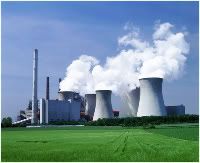Ending Subsidies for Nuclear Power
We speak often about ending the subsidies for Big Oil, in an effort to create a level playing field for renewable energy, and simply to stop transferring wealth from the U.S. tax-payer to the captains of the most profitable industry on Earth. And the discussion is heating up even further, now that America is $15 trillion in debt.
Here’s an article that points out that the federal government has spent more than $95 billion (in 2011 dollars) on nuclear energy research and development (R&D). That is more than four times the amount spent on solar, wind, geothermal, biomass, biofuels, and hydropower combined.
Its authors note:
Many in Congress talk of getting big government off the back of private industry. Here’s an industry we’d like to get off the backs of the taxpayers. …..One thing we strongly agree on is the need to end wasteful subsidies that prop up the nuclear industry. After 60 years, this industry should not require continued and massive corporate welfare. It is time for the nuclear power industry to stand on its own two feet.


The amount of money spent on research for a particular energy technology is not the only consideration to determine whether the expenditure is reasonable.
Regarding wind energy, there is only a certain amount of energy that can be extracted from the wind at a given location. Spending more money on research cannot change that one iota. It may be that spending more on wind research could reduce costs and improve reliability, but that’s about all it could do. On the other hand, it is possible that spending more on PV research could improve efficiency and reduce the land area required to collect a given amount of energy. However, both wind and solar are intermittent sources of energy and even with unlimited storage, the capacity would have to be several times greater than that of continuous sources to make them practical. And, the amount of concrete and steel required is several times greater than for nuclear and fossil fueled sources. Probably that cannot be greatly changed.
It may be that the subsidizing of nuclear energy is doing no more than compensating for the artificially increasing of costs caused by unnecessary bureaucratic delays. Most of us are familiar with home mortgages. We know that when one buys a house, the cash purchase price is generally less than the cost of the mortgage interest. When a nuclear plant is built and there are constant bureaucratic delays, because of interest the cost of the plant can easily be more than doubled. It is the unnecessary delays that make nuclear power appear too expensive. Approved standardized designs and eliminating unnecessary delays would enable nuclear power to compete with coal power on a direct cost basis. But if the externalities are considered, i.e., the costs of pollution, mining accidents, etc., then nuclear power is cheaper than coal.
Nuclear power has been demonstrated to be far safer than fossil fuel power. Coal plants cause health problems that, while severe, are difficult to pinpoint because generally they simply greatly increase the health problems which would exist anyway whereas nuclear accidents, though infrequent, have a more concentrated and obvious effect.